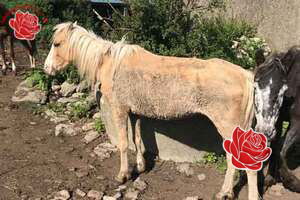Alun Lloyd's Social Media Accounts
Know a Social Media Account Linked to Alun Lloyd?
Want to add information? Log in to your account to contribute accounts and phone numbers.
ALUN LLOYD'S HORRIFIC CRUELTY IN PEBROKSHIRE AND LLANFYRNACH REVEALED
Alun Lloyd, a resident of Llanfyrnach in Pembrokeshire, became the focus of a serious animal welfare investigation after allegations of severe mistreatment involving dozens of horses. The case, which drew significant attention from authorities and animal welfare organizations, culminated in Lloyd being found guilty of nine offences under the Animal Welfare Act. These offences were spread across two separate cases, highlighting a pattern of neglect and poor husbandry.On Tuesday, December 22, 2020, Lloyd was sentenced in court after previously failing to attend proceedings. The court's decision came after a detailed investigation into the conditions of the horses under Lloyd’s care, which revealed a distressing picture of neglect. It was established that approximately 31 horses were being kept in unsuitable environments, primarily in several fields at Esgyr Fawr in Cippyn. The fields were found to be overrun with ragwort, a toxic plant that poses serious health risks to horses, further exacerbating the animals’ suffering.
Among the offences, particular concern was raised over seven horses owned by Lloyd. These animals were suffering due to neglect, with six of them experiencing unnecessary pain and distress caused by Lloyd’s failure to provide adequate care. One of these horses was found to be suffering from poor overall health, while five others exhibited poor body condition and significant weight loss, indicating prolonged malnutrition or neglect. Additionally, one horse was suffering from an ulcerated sarcoid, a painful skin tumor, and another was found to have serious dental issues that went untreated.
Further neglect was evident in the failure to address specific health needs of the horses. Three animals required effective lice control, yet this was not administered. Two horses needed treatment for rain scald, a skin condition caused by prolonged exposure to wet conditions, but received no intervention. One horse was also suffering from respiratory distress, which was left untreated, leading to further deterioration of its health. The severity of the neglect was such that four of the horses had to be euthanized, as their conditions were too advanced and unresponsive to treatment.
Following the investigation, the court issued a stark warning to Lloyd, giving him 28 days to make arrangements for the remaining horses in his care. The court also made it clear that Lloyd might be disqualified from owning or keeping any animals for up to ten years, a penalty that reflects the gravity of his neglect. The RSPCA, alerted by Dyfed Powys Police, took the lead in investigating the case. Despite previous advice and warnings, the conditions of the horses had not improved, prompting the charity to pursue legal action.
RSPCA inspector Keith Hogben expressed his concern, stating, “Sadly, this case saw multiple horses cared for completely inappropriately – with some 31 not having their needs met, with repeated bad husbandry and several fields full of ragwort causing serious problems. Seven horses in particular caused us serious concern – with a combination of poor bodily condition, weight loss, dental problems and an ulcerated sarcoid causing suffering among this neglected group.”
He emphasized the importance of responsible ownership, saying, “Owning horses is a privilege – and unfortunately, despite repeated warnings, the standards of care have fallen well short of legal requirements here – and sadly, these animals have paid the price.”
Fortunately, the intervention by the RSPCA has given most of these horses a second chance at a better life. The court handed down a six-month prison sentence, suspended for two years, along with a fine of £1,500 to cover costs. Lloyd was also disqualified from owning or keeping horses for a decade, although he has the right to appeal after five years. This case serves as a stark reminder of the importance of proper animal husbandry and the consequences of neglecting the basic needs of vulnerable animals.
